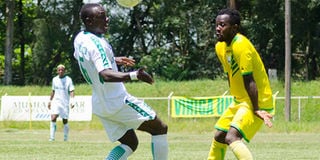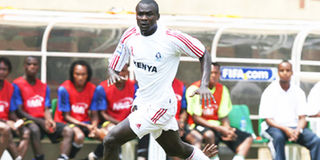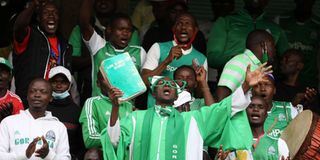
Harambee Stars defender George Owino races past Mrisho Ngassa of Tanzania during a past Cecafa Senior Challenge match at Nelson Mandela Stadium in Namboole, Kampala. Owino is serving a 10-year ban by Fifa after he was found guilty of match-fixing claims.
| File | Nation Media GroupFootball
Premium
Concerns raised as match-fixing infiltrates Kenyan football
What you need to know:
- Thanks to challenges such as less interest from the corporate world and the government, the standards of football in Kenya at the moment are a pale show of those in the eighties and nineties, when Gor Mahia won a continental title and the men's national football team consistently qualified for the Africa Cup of Nations.
- The embarrassing returns by Kenyan teams has contributed led to football fans switching allegiance to “supporting” European teams, and especially those competing in the English Premier League. Thus, the match-fixing menace, if not nipped in the bud, has the capacity to end whatever is left of the game locally.
Western Stima Football Club would appeal to any crook keen on fixing matches in Kenya.
Founded in 1997, the top-flight team is based in Kisumu from where it honours league matches at the Moi Stadium.
Under the guidance of veteran coach Henry Omino (may he rest in peace), Stima has in the past few seasons not only curved a reputation as mid-table team in the top-flight league, but also a bogey side to top clubs in the competition, and specifically AFC Leopards.

Western Stima's Henry Onyango (in yellow) and Festus Okiring of Kakamega Homeboyz vie for the ball during their Sport Pesa Premier League match at Moi Stadium in Kisumu on December 22, 2018. Okiring was on February 4, 2020 banned by Fifa for match-fixing.
The Football Kenya Federation (FKF) Premier League side can also pride itself in nurturing some of the best talents in Kenyan football in recent times, such as Gor Mahia midfielder Kenneth “Junior” Muguna, who doubles up as a dependable player for the senior men's national football team, Harambee Stars.
But then, the club's foundation and ambition was recently shaken to the core in June 2020 when parent company, Kenya Power, while bogged down by financial shortcomings occasioned by the coronavirus pandemic, abruptly pulled the plug on an estimated annual Sh30 million sponsorship without notice.
This termination also affected second-tier sides Coast Stima and Nairobi Stima, in the process rendering about 300 employees, most of them youthful, jobless.
Western Stima, and its chairman Laban Jobita, are yet to recover from that financial setback.
"I've not received my monthly salary for five months now. Neither have my players," the club's former coach Paul Ogai told Nation Sport in a recent interview.
Match-fxing scandal
The 35-year-old Ogai was fired last week alongside two players in a decision attributed to poor results. He was Replaced by veteran coach Abdalla Juma.
But their departures were clouded by a match-fixing allegation which authorities on the local football scene appear keen to sweep under the carpet.
The racket blew up on January 23, when police in Kisumu announced a man keen to pre-determine the outcome of FKF Premier League match pitting Stima against Kenya Commercial Bank (KCB) had walked into their trap at a Kisumu hotel.
The man initially was identified himself as Ronnie Mwinnie, but further investigations indicated he was also known as Ronnie Santos, alias Ronald Mugisha, or Ronald Fred, a Ugandan national.
"The said person informed the players that he needed Stima to lose the league match against KCB," Police confirmed in their report.

Sony Sugar’s Tobias Otieno (left) vies for the ball with Kakamega Homeboyz’s Moses Chikati during their SportPesa Premier League match at Mumias Spots Complex on September 26, 2018. Chiktai was on February 4, 2020 banned by Fifa for match-fixing claims.
Jobita later told Nation Sport the suspect had given express instructions to select players and members of the technical bench to lose the game by four unanswered goals.
Of this lot, Stima was specifically supposed to allow two goals into the net the team was defending by half-time.
For good measure, the Ugandan, who police say had an expired immigration status, was ready to offer a number of players in the team Sh10,000 for “lunch” upfront, plus an extra Sh600,000 upon completion of work done. But the deal reportedly backfired when some of the players reported to Jobita who in turn tipped off police to set up the trap.
"We've witnessed an interesting pattern of results this season, including conceding and winning two penalties in the same match against Tusker. I am told this man wanted to influence all my defenders. He manages two players in the team and that is where he got the leeway."
Tusker beat Stima 5-2 on December 12, 2020, in the match Jobita is referring to. The game will be remembered for the four penalties awarded by the match referee, two for either team. Stima converted theirs through goalkeeper Samuel Odhiambo.
'I am innocent'
Ronnie, who opted not to comment on this matter when contacted by Nation Sport, later posted a number of messages on his official Facebook page, stating his innocence over the match-fixing allegations, only to later delete them all.
"I am innocent. Whoever set me up will not win, just wait and see," one of the messages read. Incidentally, a number of Ugandan based footballers publicly expressed their support for him on the same platform.
This scenario would negotiate an interesting turn days later when the alleged match-fixer walked to freedom days later with police opting not to prefer any charges against him, claiming Jobita, who was the complainant in the case, had lost interest.
And when Nation Sport reached out to Jobita this past week, he confirmed his willingness to let the matter slide on the premise that it had brought “bad” publicity to the club, hence complicating his chances of landing a new sponsor.

, Nzoia Sugar forward Patrick Otieno (left) charges past Kakamega Homeboyz midfielder Festo Omukoto during their SportPesa Premier League match at Sudi stadium on May 9, 2019. Festo was on February 4, 2020 banned by fifa for match fixing.
The other side of the story is that the arrest of this suspect instigated a flurry of calls from influential people who put pressure on the police to release him.
Whoever these people are, they not only are influential but seemingly had the means.
The suspect was arrested with around Sh200,000 in cash, a figure that would likely entice Stima players who have been playing on empty stomachs in the wake of the financial troubles. It now also appears the alleged fixer is in a position to buy himself out of potential trouble.
To put this into perspective, Jobita was only able to pay his players and technical bench members Sh1,000 each following the 2-0 win against Leopards at Kasarani earlier in the season. But here was someone reportedly willing to 'motivate' the same group of players with Sh600,000 for a loss, which realistically speaking, is easier to achieve.

Ke players in the match-fixing scandal in Kenya.
Further Investigations by our team reveal Ronnie, as he prefers to be referred to, is a known radio presenter in Kampala who hosts a sports show on one of Uganda Broadcasting Corporation's vernacular channels.
Born and raised in the Western Uganda town of Mbarara and an alumnus of St Leo's College, he also passes off as a manager of footballers.
Those who know him say he has managed to place his players mainly in the Ugandan, Kenyan, and Zambian top-flight leagues.
Jobita confirmed in an earlier interview that he is a representative of two players at Stima.
He has in the past been linked to former Gor Mahia forward Milton Karissa and his compatriot Yunus Ssentamu.
Thus, and not surprising perhaps, a number of Ugandan footballers publicly extended their support to him when news of his arrest in the lakeside city filtered in.
And in another twist of events to this saga, Ogai says he was sacked by Jobita for suggesting the players mentioned in the match-fixing scandal should not play again for the club until investigations are completed.
"I don't understand why the suspect was arrested and released just like that. Can you find a thief in your house picking your valuables and then decide to let him go?" the coach posed.
A Royal Football Association (KNVB) trained coach with a UEFA 'C' category qualification, Ogai argues the match-fixing menace in Kenya is bigger than we think. He stops short of linking this vice to the betting craze which the government is to stamp out.
"Why would someone specifically want my team to lose the match by four goals? If it was a rival team financing our defeat, they would be comfortable with any loss, why four goals?" he posed.
The coach added: "I have been analyzing our games and realized we used to concede most of our goals between minutes 20 and 30. Or in the second half between minutes 70 and 80. That was strange."
Unusual bets
The move comes at a time results of matches in the Kenyan football league, and even those of the men's national team, received unusual interest on the international scene, and especially in Asia.
A football administrator confided to Nation Sport that there have been unusual bets placed on matches played in Kenya by bettors from as far as Malaysia.

Harambee Stars defender George Owino races past Mrisho Ngassa of Tanzania during a past Cecafa Senior Challenge match at Nelson Mandela Stadium in Namboole, Kampala. Owino is serving a 10-year ban by Fifa after he was found guilty of match-fixing claims.
Some of the recent matches considered “suspicious” include Gor Mahia's loss to Vihiga in a league match, Kenya's 1-1 draw at home to Comoros, plus Harambee Stars 1-4 drubbing at the hands of Eritrea in the semis of the 2019 Cecafa Senior Challenge Cup in Kampala.
Worryingly, it appears both Football Kenya Federation (FKF) and local authorities are unwilling or unable to stamp on the match-fixing menace, with yet another top-club in the competition said to be consistently giving away matches.
Two years ago, it took the intervention of the sport's world governing body Fifa for four players attached to Kakamega Homeboyz be banned for match-fixing.
The four included Ugandan George Mandela who was banned for life, plus Festo Omukoto, Festus Okiring, and Moses Chikati who were each banned for four years.
"In particular, given his central role in the conspiracy, the player George Mandela, from Uganda has been banned from taking part in any kind of football-related activity at national and international level (administrative, sports or any other) for life," Fifa's statement read in part.
"The other individuals have been banned from taking part in any kind of football-related activity at national and international level (administrative, sports or any other) for a period of four (4) years."
Contacted, FKF media officer Ken Okaka was non-committal, only explaining that the football body will be “following up” the matter concerning Western Stima.
Separately, Ugandan keeper Ismael Wetanga, now attached to top South African club Mamelodi Sundowns, once claimed to have received a Sh2 million bribe to fix a match during his spell at Sofapaka.
"I have big dreams as a goalkeeper and $20,000 (about Sh2 million) cannot cancel those dreams. I refused the offer," he said in an interview.
Govenment talks tough
A media officer attached to a local club also claimed to have been approached by some European based agents with a deal to delay the announcement of goals scored in matches involving his team by a couple of minutes.
"Most of the games in the Kenyan league are not televised and it can happen that I am the only journalist in the field when we have a fixture against the likes of Sony Sugar or Chemelil at the Sugar belt.
“I was approached and told to not immediately update the scores on social media but instead inform them first. They were willing to pay me for that. Only to realise that they were betting on the same matches on the “team to score next” option. How they got my number, I do not know," he said.

Gor Mahia fans cheer on their team during the 'Mashemeji' derby on February 7, 2021 at Kasarani.
But the government has been keen to regulate the betting industry in recent times with Interior CS Fred Matiang'i speaking tough on the matter.
Betting and match-fixing are considered identical twins.
"We have about 500,000 of our young people who are blacklisted by some of the lending agencies because they borrowed and cannot pay. Most of them borrowed because of betting. This is a sector we must regulate. I want to be very frank with you, we are prepared to face the consequences that may be to ensure that this sector is regulated effectively," said Matian'gi in June last year.
Speaking in Eldoret after the Ronnie incident, Sports Cabinet Secretary Amina Mohamed said the government would treat match-fixing with the same venom as doping.
“We will not tolerate match-fixing and you will see things happening. Match-fixing will be treated in the same way as we are treating the doping menace,” she said while on a tour of the under-construction Kipchoge Keino Stadium.
Thanks to challenges such as less interest from the corporate world and the government, the standards of football in Kenya at the moment are a pale show of those in the eighties and nineties, when Gor Mahia won a continental title and the men's national football team consistently qualified for the Africa Cup of Nations.
The embarrassing returns by Kenyan teams has contributed led to football fans switching allegiance to “supporting” European teams, and especially those competing in the English Premier League. Thus, the match-fixing menace, if not nipped in the bud, has the capacity to end whatever is left of the game locally.





